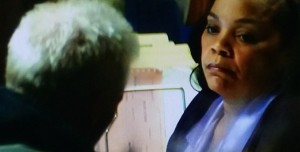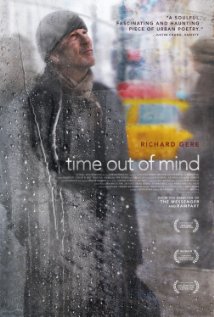Actress Tonye Patano opens up about social work role in “Time Out of Mind”

Tonye Patano. Photo courtesy of actor.
You may recognize Tonye Patano from the TV shows “Weeds” or “Sex in the City,” but she has been active in indie films and on stage for decades.
Her latest role will hit close to home. She plays a clinical intake social worker, Ms. Jackson, in “Time Out of Mind,” a film that tries to capture the truth behind a stereotypically successful person’s descent into homelessness and helplessness.
In a key scene, Ms. Jackson uses a mixture of empathy and firmness to help George (actor Richard Gere), a man who was had been squatting in a friend’s apartment who suddenly finds himself homeless.
It is an American drama written and directed by Oren Moverman. Besides Gere the film stars Ben Vereen, Kyra Sedgwick, and Steve Buscemi. It was recently released to mainstream U.S. theaters and is available on demand on cable.
SocialWorkersSpeak.org asked Patano about the film, her role in it, and about her life as an actress and storyteller.
Q: How did you get the role, featuring a scene opposite Richard Gere?
Patano: I did not know about this piece until it was presented to me and I just auditioned for it… I immediately recognized this woman, in my story: who this woman was, how she spoke to me. I’m sure (the director, Oren Moverman) must have seen whatever quality he needed in me. He saw in me — something.
I always say “yes” to (doing) indies – especially if it’s good work and good people…. It’s more of an impression of how the craft really does seamlessly merge with reality of what the storytelling is about. This movie is a peek into what happens in real life. And in real life these are true things.
Q: Tell us about the pivotal scene with Richard Gere, when he reaches out for help.
Patano: My character was allowed to not necessarily be taken in by (Richard Gere’s character’s charm) – but to SEE HIM, and what happens when you take that tool (his charm) away. And I think, in a lot of ways, that was what his character was going through in this play, this movie.
At some point, you release the idea that this is (actor) Richard Gere, the leading man, and he becomes George, the homeless man, whose life is falling apart. And we sort of, for the first time, realize that can happen to anyone. And that’s a part of this (my) character: She probably sees that again and again: you know, people who have it all, or think they do – and this is where they are… When (Gere) walks into (her) office in the wee hours of the morning, this woman is just tired. She’s been doing this all day. (But) she sees this man in a different way…She saw him and felt seen.
I was allowed to veer from the script, here and there, to some degree, to sort of take him (Gere) off mark a little bit, unsettle him a little bit…
So when I’m approaching this part, I have all that history and background. In other words, our life story informs how we tell stories – what the characters bring. There was no research (for the role). This was me, showing up, and being a human.
Q: Specifically how did the character, Ms. Jackson, speak to you?

Social worker Ms. Jackson (Tonye Patano) in scene with George (Richard Gere). Screenshot courtesy of Time out of Mind.
Patano: I was born in California, where my mother was an entertainer. Through a quirky set of circumstances — it was the 1960s — I ended up for three months in an abusive foster home and my mom ended up in a mental institution, for those 90 days… Had I not had such a stable, generous home for the first five years of my life in California, I would not be the strong child I was then and the stronger person I would become. When you are suddenly thrust into the system, it’s not just the one person, but all the parts around it that impact the person or situation. And one part can go horribly wrong and something can go “just right” and you can make it.
I think those subtle life experiences allow me, as an actor or storyteller, to just be present in the moment, and see the person… And I don’t think that my going through that was an accident. I think that that impression in life was something that I needed to move on, to become the storyteller or the actor, or the writer or the director that I can be.
(My mother) came back and she was not afraid to go to the system to ask for help (then, eventually, she became a crisis counselor). So watching her deal with people, both sides of the coin, of people informing on each other – or the system not putting things together properly so that this person was enraged or they didn’t get that, or the system breaking down — it was fascinating. Or to see people use this system to their advantage or for what it is – something that’s there and meant to help you…
What you guys (social workers) do is an amazing thing. I was very proud of my mom to be able to make those transitions (to crisis counseling) but it can be exhausting and soul-draining. And if you’re in the trenches…helping people relocate from an old job to the next (or helping) someone who literally got devastated by (hurricane) Sandy…the person on the other side of the phone has a lot of power in those moments, to make life easier.
Just by saying the right thing at the right time – even if it’s “I’m sorry” or, “Gee, that must be difficult” or “Wow, I don’t know. Let me find out” — as opposed to just being so tired and frustrated that you can’t fix it, so you lie…this shows that, at any moment, it could go right, and how it only takes one thing to make it go the other way. And that can be on either side of the table.
Speaking of “either side,” my empathy can work for both the positive and negative. In other words, I am not always playing empathetic roles. Sometimes, my ability to see all sides means that I am asked to play not-so-nice characters.
Q: Is there anything that makes the film especially unique?
Patano: The hospital exteriors were at Bellevue but my scene with Richard Gere was on a set…(The director, Oren Moverman) did some amazing work: instead of (having) the camera in your face, you didn’t always know where the camera was. It was like he was peeking into life….That was the effect he wanted for the entire movie – that you were sort of on the periphery, peeking in…like we look at the world through the homeless, like a slice of time.
Q: What is the difference between TV, film and theater for an actor?
Patano: And the difference between film, television and stage… is that, as actors, in film and television – we just bring what we bring. The director will direct you this way or that way – give you the script, or change, or ask you to improve (or they want it an exact way). The final product is picked by the director and the editor. So whatever performance you see up there has been chosen by someone else, really. It’s because they shape that story.
When I’m on stage, in theater, it’s a visceral, moment-to-moment thing. That performance is the only performance you are going to see of that particular show in that particular time. And the audience that’s there – they will never be that audience again. And everybody has their own moment that one time; and then the next time, it’s a different one, a different audience – an immediate thing. And the performance you see is unique to that day. But it’s still a collaborative effort. That’s what’s special about theater.
Whereas in television, it is just as dynamic, but someone else is painting that story, someone else is putting the puzzle pieces together…which moves it in a different way or different direction.

Film Poster
Q: You talk about three-dimensional storytelling to avoid stereotyping. What do you mean?
Patano: All of your life experience comes to that one moment. In that one moment, you should be able to see who the person is, who that character is – so it’s not a two-dimensional thing. And the only way to do that is to bring truth and honesty to those moments. I just happen to have a lot of life experience that lend themselves to that…for this particular part.
But that same life experience tells a different story when I’m playing Heylia on “Weeds,” or if I’m playing a nurse in “Sex and the City” or whatever those things are.
If you are servicing a client (as a social worker) you have empathy because you understand where that person is coming from. And even if you don’t know exactly, at least you have the willingness to ask the right questions and not assume – or (stereo) type them. It may not be your life experience, but it allows you to have an extra bit of understanding – so that you are able to ask the right questions. I think those subtle life experiences allow me, as an actor or storyteller, to just be present in the moment, and see the person.
And how I approach things as an actor is how I approach the world. And that’s what we should do, always, as humans – is approach the world in a multi-dimensional way as opposed to (stereo) typing something so that we can dismiss it and move on… It takes more to engage and actually SEE things. Once you see something, you can deal with it. If you stereotype it, you can put it someplace. Often, when we see things, they’re not neat. They’re messy.
Q: Anything more to add about the film or the team?
Patano: The (members of the) team were quite lovely and very generous and allowed space for the work. I didn’t feel stress or tension. I didn’t feel anxious, like they weren’t going to get the shots. Again, the camera was unobtrusive…
Richard Gere helped me carry my bags to the car…The idea that he’s carrying my stuff to the car…such a sweetheart. People were lovely. And I think that’s important when you’re dealing with a film like this. And I think I would work with Oren again and again. I really liked his approach to storytelling; and I really thought it was different.
It’s the totality of the piece that makes it what it is…good, bad or indifferent. And that’s kind of what we do in the world, in a lot of ways. As a person who helps other people in the world, as a social worker. It’s not just that one person, it’s all of the mechanisms together that make it successful or not.
Bio: The actor Patano has garnered multiple nominations and awards for her performances on stage and screen. She appeared on Broadway in Neil Simon’s 45 Seconds from Broadway (Broadway), and in numerous Off Broadway and regional productions, including , Father Comes Home From The Wars (The Public Theater & ART), The Last Goodbye (Old Globe), and The Blood Quilt (Arena Stage). Ms. Patano starred in the National Tour of Legends (The National Theatre) and the award winning play Ruined as Mama Nadi (recognized by multiple Critics Associations for Best Lead Actress). Film work includes roles in Diving Normal, Ponies, The Hurricane, The Savages, Little Manhattan, The Taking of Pelham 123, Company Men, Every Secret Thing, Time Out of Mind and the upcoming Jack of The Red Hearts. TV credits include recurring and guest star roles on One Life To Live, Sex and the City, Eli Stone, Monk, Law & Order: SVU, The Americans, and most notably as series regular Heylia James on Showtime’s critically acclaimed Weeds.
Social workers help people from all walks of life overcome life’s challenges. To learn more visit the National Association of Social Workers’ “Help Starts Here” website.
| Leave A CommentAdvertisement
4 Comments
Leave a Comment
You must be logged in to post a comment.



I hope that this movie will enlighten the public about the vital role of Social workers. I have just graduated as a Social workers
Before I want to say Congratulation!
My name is Altanchimeg Dugersuren. I am a lecturer of School of Business, NUM. My profession is social work.
This is a very good news. I am very very very happy to read it. My country is just developing and social welfare sector is too weak. I really want to improve this sector and now I’m doctoral student of social work. I will connect and send some requist about our future relationship.
Good luck!
kudos to Tonye and again to Richard Gere! Richard also played the part of a man with bi-polar disorder in the older movie, “Mr. Jones”….
Actors like these help the public to see what social workers do.
thank you.
I hope it paints a picture of the positive side of SW